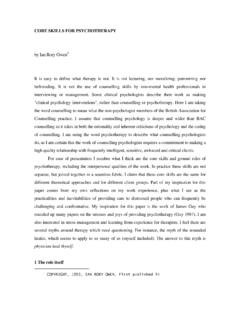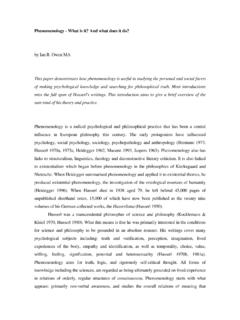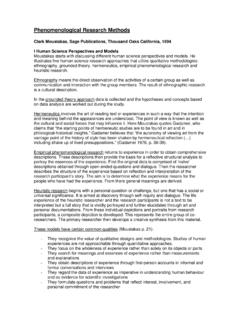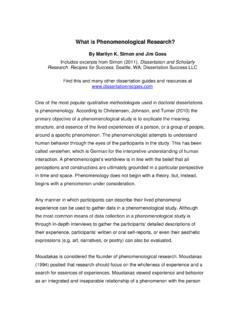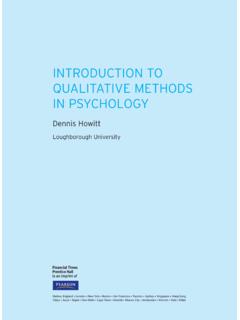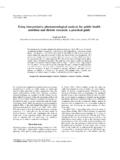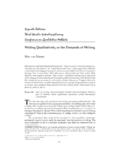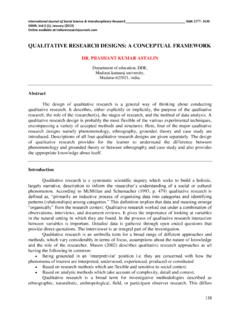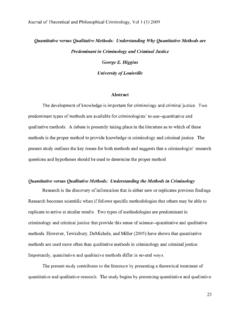Transcription of Social constructionism and the theory, practice and ...
1 Social constructionism and the theory, practice and research of psychotherapy: A phenomenological psychology manifesto by Ian Rory Owen1 Social constructionism may be defined as a perspective which believes that a great deal of human life exists as it does due to Social and interpersonal influences (Gergen 1985). Although genetically inherited factors and Social factors are at work at the same time, Social constructionism does not deny the influence of genetic inheritance, but decides to concentrate on investigating the Social influences on communal and individual life.
2 The subjects that Social constructionism is interested in are those to do with what anthropologists call culture, and sociologists call society: the shared Social aspects of all that is psychological. There are several versions of Social constructionism with different writers making different emphases. Two distinguishing marks of Social constructionism include the rejection of assumptions about the nature of mind and theories of causality, and placing an emphasis on the complexity and interrelatedness of the many facets of individuals within their communities.
3 Causality may exist within specific cultures but much work needs to be done before these connections can be described with any certainty. Social constructionism regards individuals as integral with cultural, political and historical evolution, in specific times and places, and so resituates psychological processes cross-culturally, in Social and temporal contexts. Apart from the inherited and developmental aspects of humanity, Social constructionism hypothesizes that all other aspects of humanity are created, maintained and destroyed in our interactions with others through time.
4 The Social practices of all life begin, are recreated in the present and eventually end. For psychotherapy, this view emphasizes the importance of the acquisition, creation and change of emotional behaviour, therapeutic ability and ways of interpreting things and people. Because the genetic material of each race and region is different, as well as the cultural practice , then we say right from the start that there is no universal human nature. What Social constructionism shows to be important are 1 ALL RIGHTS RESERVED, COPY RIGHT, 1995.
5 First published as El construccionismo Social y la teoria, practica e investigacion en psicoterapia: Un manifiesto psicologia fenomenologica. (trans I. Caro). Boletin de Psicologia, 46, 161-186. 1 the ways in which socialisation and enculturation, amongst the people we have known, plus the current influence of those whom we now know, are the most active in shaping our mutual existence with others. Conventional psychology often emphasizes the physiological and inherited aspects of human existence.
6 This allegedly "scientific" psychology defines itself as the study of individual variations of mind and behaviour. Conventional psychology attributes human acts to persons with "individual" minds which it aims to objectify, measure and categorise in an "objective" manner. It also believes that it is possible to exclude the aims, values, presence and biases of researchers. Social constructionism argues that true objectivity is absent in the human sciences because all methods require one set of subjective humans to rate another set of subjective humans.
7 So, "the tool for knowing" is inevitably subjective people themselves. As regards the community of human scientists, until a truth-claim is acceptably demonstrated to be a universal or local truth, then it must be held separate and used only with caution. However, many human scientists throw caution to the wind and put their belief and life force into provisional claims which are not shared by the whole community of workers. Conventional psychology contains a division between two opposing schools of thought about the truth of human nature.
8 One we could call "groupism" which is the view that human behaviour can only be understood within its overall Social context. Any individual is regarded as being influenced by the people around them, much more than by their own traits. The other view we could call "individualism" which regards human behaviour as the result of the personal choices of an individual and their, values and unique personal characteristics. These two opposing views are shared by different camps in the human sciences.
9 Psychoanalysts, counsellors and therapists mainly take the individualism view. Family therapists, sociologists, Social psychologists and anthropologists mainly take the groupism view. This paper integrates both arguments to produce contextual thinking where individual qualities and Social forces are seen in parallel as a co-construction of individuals in their communities, more of this below. An example from the history of astronomy illustrates some key points in understanding Social constructionist analysis because it clearly shows the changes in knowledge and Social practices, the processes of acceptance and rejection of beliefs, that can be observed by studying the Social behaviour of the followers of theories.
10 At one time it was taken to be a fact that the Earth was the centre of the universe and that the other planets revolved around it in circular 2 orbits. In 1663 Galileo posited that the Sun was the centre of the universe and that the Earth and other planets revolved around that. His view appeared to the church and orthodox establishment as a heresy, and he was put in prison for his views. It took many years for the new theory to be accepted. The point of this example is that innovations do occur in knowledge and concomitant Social practices (Kuhn 1970).

